
The impending live broadcast of the 42nd and final episode of network TV’s first black-hosted variety show becomes an existential nightmare for its celebrated star in Colman Domingo and Patricia McGregor’s Lights Out: Nat “King” Cole, a Geffen Playhouse West Coast premiere not without its problems but one well worth catching, and not just for the drama-song-and-dance showcase it provides its triple-threat star Dulé Hill.
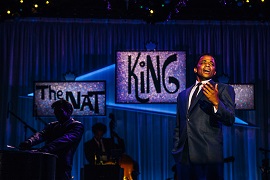 It’s fifteen minutes to showtime on December 17, 1957 and makeup artist Candy (Mary-Pat Green, terrific in Thelma Ritter mode) has popped into Nat’s dressing room to apply “just a sprinkle of fairy dust” on the star’s too-dark-for-national-TV skin, and if the temporary complexion lightening hasn’t bothered Nat before (“It’s just the South, you know,” Candy reminds him), tonight it does, particularly since were it not for fear of audience reaction below the Mason-Dixon line, The Nat King Cole Show wouldn’t have spent the last thirteen months in search of a national sponsor. (It turns out Nat is right when he says that “It seems Madison Avenue is afraid of the dark.”)
It’s fifteen minutes to showtime on December 17, 1957 and makeup artist Candy (Mary-Pat Green, terrific in Thelma Ritter mode) has popped into Nat’s dressing room to apply “just a sprinkle of fairy dust” on the star’s too-dark-for-national-TV skin, and if the temporary complexion lightening hasn’t bothered Nat before (“It’s just the South, you know,” Candy reminds him), tonight it does, particularly since were it not for fear of audience reaction below the Mason-Dixon line, The Nat King Cole Show wouldn’t have spent the last thirteen months in search of a national sponsor. (It turns out Nat is right when he says that “It seems Madison Avenue is afraid of the dark.”)
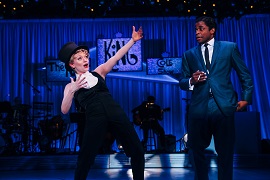 The broadcast starts off promisingly enough with Cole soloing “It’s A Good Day,” then duetting “Somewhere Along The Way” with guest star Sammy Davis Jr. (Daniel J. Watts) followed by a full-cast “Caroling Caroling,” and there’s no dearth of female talent w Betty Hutton (Ruby Lewis) joins Nat to belt out her signature “Anything You Can Do.”
The broadcast starts off promisingly enough with Cole soloing “It’s A Good Day,” then duetting “Somewhere Along The Way” with guest star Sammy Davis Jr. (Daniel J. Watts) followed by a full-cast “Caroling Caroling,” and there’s no dearth of female talent w Betty Hutton (Ruby Lewis) joins Nat to belt out her signature “Anything You Can Do.”
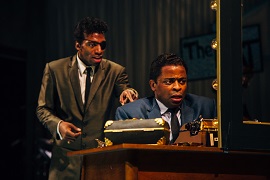 Younger Geffen audience members already flabbergasted at NBC’s insistence on a paler shade of black will find equally if not even more shocking the “decency” yardstick brought out to ensure an inoffensive distance between Cole and his white female song partner, though a flashback to childhood bullying that had young Nat being accused of “dirty skin” simply because of his color will likely ring every bit as true in 2019 as it did sixty-two years ago.
Younger Geffen audience members already flabbergasted at NBC’s insistence on a paler shade of black will find equally if not even more shocking the “decency” yardstick brought out to ensure an inoffensive distance between Cole and his white female song partner, though a flashback to childhood bullying that had young Nat being accused of “dirty skin” simply because of his color will likely ring every bit as true in 2019 as it did sixty-two years ago.
Not that Lights Out: Nat “King” Cole is all about injustice.
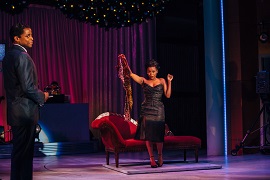 Indeed, much of its eighty-or-so-minute running time is filled with some of the best vocalizing in town, and not just by Hill’s smooth-as-silk Nat, Watts’ firecracker Sammy, and Lewis’s uber-vivacious Betty but by Gisela Adisa’s sizzlingly feline Eartha Kitt (“What’s Wrong With Me?) and her effervescent Natalie Cole (“Unforgettable”), Zonya Love’s warmly maternal Perlina (“Orange Colored Sky”), and Connor Amacio Matthews’ charmer of a preteen Billy Preston (“Blueberry Hill”) and Young Nat.
Indeed, much of its eighty-or-so-minute running time is filled with some of the best vocalizing in town, and not just by Hill’s smooth-as-silk Nat, Watts’ firecracker Sammy, and Lewis’s uber-vivacious Betty but by Gisela Adisa’s sizzlingly feline Eartha Kitt (“What’s Wrong With Me?) and her effervescent Natalie Cole (“Unforgettable”), Zonya Love’s warmly maternal Perlina (“Orange Colored Sky”), and Connor Amacio Matthews’ charmer of a preteen Billy Preston (“Blueberry Hill”) and Young Nat.
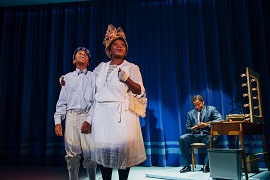 Only passing mention is made of Cole’s discovery of a racial epithet burned on his Hancock Park front lawn, and not much is made about the criticism he received for performing for all-white audiences, which may be why the anger that propels much of Lights Out seems more its co-writers’ entirely justified rage at the backwards steps our country has taken since Election 2016 than Cole’s at having himself pulled the plug on his network show rather than accept a kiss-of-death time slot, and an overwrought, overlong “Night Before Christmas” sequence may have a point to make but for this reviewer it borders on the incoherent.
Only passing mention is made of Cole’s discovery of a racial epithet burned on his Hancock Park front lawn, and not much is made about the criticism he received for performing for all-white audiences, which may be why the anger that propels much of Lights Out seems more its co-writers’ entirely justified rage at the backwards steps our country has taken since Election 2016 than Cole’s at having himself pulled the plug on his network show rather than accept a kiss-of-death time slot, and an overwrought, overlong “Night Before Christmas” sequence may have a point to make but for this reviewer it borders on the incoherent.
Also, while Lights Out: Nat “King” Cole merits major snaps for diversity in casting (a splendid Bryan Dobson plays Nat’s unnamed Producer as both ally and adversary and Brandon Ruiter shines too as the TV’s show’s Stage Manager), including African-American cast members in network TV production numbers in the segregated ‘60s (including some black-and-white male-female pairings) proves both jarring and historically inaccurate.
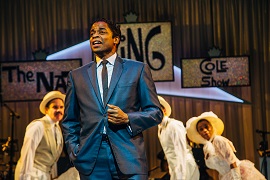 Caveats aside, there’s nothing less than spectacular about Hill’s revelatory star turn, the Broadway musical vet displaying talents sure to send West Wing and Suits fans to their feet, and never more than in “Me And My Shadow,” a show-stopping Jared Grimes-choreographed tap duet with Watts’ dazzling Sammy Davis Jr., whose performance as the Rat Pack icon deserves a spin-off of his own.
Caveats aside, there’s nothing less than spectacular about Hill’s revelatory star turn, the Broadway musical vet displaying talents sure to send West Wing and Suits fans to their feet, and never more than in “Me And My Shadow,” a show-stopping Jared Grimes-choreographed tap duet with Watts’ dazzling Sammy Davis Jr., whose performance as the Rat Pack icon deserves a spin-off of his own.
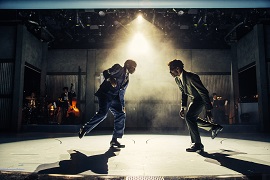 As she did at Lights Out: Nat “King” Cole’s 2017 Philadelphia World Premiere, co-writer McGregor directs with flair, aided by her out-of-town design team: scenic designer Clint Ramos’ era-perfect variety show set (joined by Ryan Howell at the Geffen), Katherine O’Neill’s nostalgic 1950s costumes, Alan C. Edwards’ striking lighting design, and Alex Hawthorn’s crystal-clear sound design.
As she did at Lights Out: Nat “King” Cole’s 2017 Philadelphia World Premiere, co-writer McGregor directs with flair, aided by her out-of-town design team: scenic designer Clint Ramos’ era-perfect variety show set (joined by Ryan Howell at the Geffen), Katherine O’Neill’s nostalgic 1950s costumes, Alan C. Edwards’ striking lighting design, and Alex Hawthorn’s crystal-clear sound design.
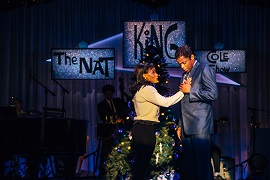 New to the Geffen run are choreographer Edgar Godineaux (who knows his variety show dance steps well) and musical director David Witham, who conducts and plays keyboards in the Lights Out: Nat “King” Cole band, joined behind bandstands by Edwin Livingston, Brian Miller, and Greg Poree, all of whom would seem to have time-traveled from the 1950s to 2019 Westwood as they bring to musical life music supervisor John McDaniel’s arrangements and orchestrations.
New to the Geffen run are choreographer Edgar Godineaux (who knows his variety show dance steps well) and musical director David Witham, who conducts and plays keyboards in the Lights Out: Nat “King” Cole band, joined behind bandstands by Edwin Livingston, Brian Miller, and Greg Poree, all of whom would seem to have time-traveled from the 1950s to 2019 Westwood as they bring to musical life music supervisor John McDaniel’s arrangements and orchestrations.
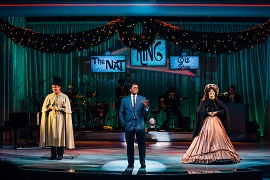 Dennis Whitehead Darling is associate director. Grimes provides additional choreography.
Dennis Whitehead Darling is associate director. Grimes provides additional choreography.
Casting is by Phyllis Schuringa, CSA. Ross Jackson is production stage manager and Lindsay Lowy is assistant stage manager.
Overambitious and flawed it may be, but at its best Lights Out: Nat “King” Cole provides a much-needed history lesson/reminder of the progress we have made and the work yet to be done in the struggle for equality for all. For Dulé Hill’s mesmerizing, indefatigable star turn alone, it more than merits the standing ovation it receives.
Geffen Playhouse, 10886 Le Conte Ave., Westwood.
www.geffenplayhouse.com
Tags: Colman Domingo, Geffen Playhouse, Los Angeles Theater Review, Nat King Cole, Patricia Mcregor



 Since 2007, Steven Stanley's StageSceneLA.com has spotlighted the best in Southern California theater via reviews, interviews, and its annual StageSceneLA Scenies.
Since 2007, Steven Stanley's StageSceneLA.com has spotlighted the best in Southern California theater via reviews, interviews, and its annual StageSceneLA Scenies.







 COPYRIGHT 2025 STEVEN STANLEY :: DESIGN BY
COPYRIGHT 2025 STEVEN STANLEY :: DESIGN BY